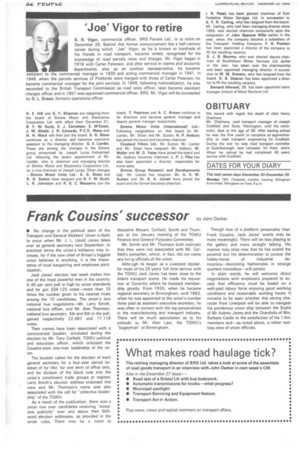Frank Cousins' successor by John Darker
Page 34

If you've noticed an error in this article please click here to report it so we can fix it.
• No change in the political slant of the Transport and General Workers' Union is likely to occur when Mr. J. L. (Jack) Jones takes over as general secretary next September. In practical terms the union's militancy may increase, for if the new chief of Britain's biggest union believes in anything, it is the importance of local bargaining and employee participation.
Jack Jones' election last week makes him one of the most powerful men in the country. A 40 per cent poll is high by union standards and he got 334,125 votes—more than 10 times the number given to his nearest rivals among the 10 candidates. The union's two national bus negotiators—Mr. Larry Smith, national bus officer, and Mr. Alan Thomson, national bus secretary, 5th and 9th in the poll, gained respectively 22,487 and 17,118 votes.
Their names have been associated with a controversial booklet, circulated during the election by Mr. Tony Corrield, TGWU political and education officer, which criticized the Cousins-style one-man leadership of the union.
The booklet called for the election of each general secretary for a four-year period (instead of for life), for one term of office only, and for division of the block vote into the union's constituent trade groups or regions. Larry Smith's election address endorsed this view and Mr. Thomson's name was also associated with the call for "collective leadership" of the TGWU.
As a result of the publication, there was a union .row over candidates receiving "excessive publicity" over and above their 500word election addresses, as provided in the union rules. There may be a move to
discipline Messrs. Corfieid, Smith and Thomson at the January meeting of the TGWU Finance and General Purposes Committee.
Mr. Smith and Mr. Thomson both maintain that they were not associated with Mr. Corfield's pamphlet, which, in fact, did not name any living officials of the union.
Althr ugh he began as a Liverpool docker, for most of his 25 years' full time service with the TGWU Jack Jones has been close to the inland transport scene. He made his reputation at Coventry where he boosted membership greatly. From 1955, when he bacame regional secretary at Birmingham, until 1963, when he was appointed to the union's number three post as assistant executive secretary, he was often in contact with the top personalities in the manufacturing and transport industry. There will be much speculation as to his attitude to Mr. Alan Law, the TGWU's -bogeyman" at Birmingham.
Though less of a platform personality than Frank Cousins, Jack Jones' words may be more meaningful. There will be less playing to the gallery and more straight talking. His manner may relax now that he has scaled the pyramid but his determination to pursue the
hobby-horse of industrial democracy—becoming fashionable in strange quarters nowadays—will persist.
In plain words, he will welcome direct negotiations with employers prepared to accept that efficiency must be based on a well-paid labour force enjoying good working conditions and reasonable working hours. It remains to be seen whether this strong character from Liverpool will be able to navigate his ponderous union ship between the Scylla of Mr Aubrey Jones and the Charybdis of Mrs. Barbara Castle to the satisfaction of his 1.4m. members and—as noted above, a rather restless crew of union officials.


























































































